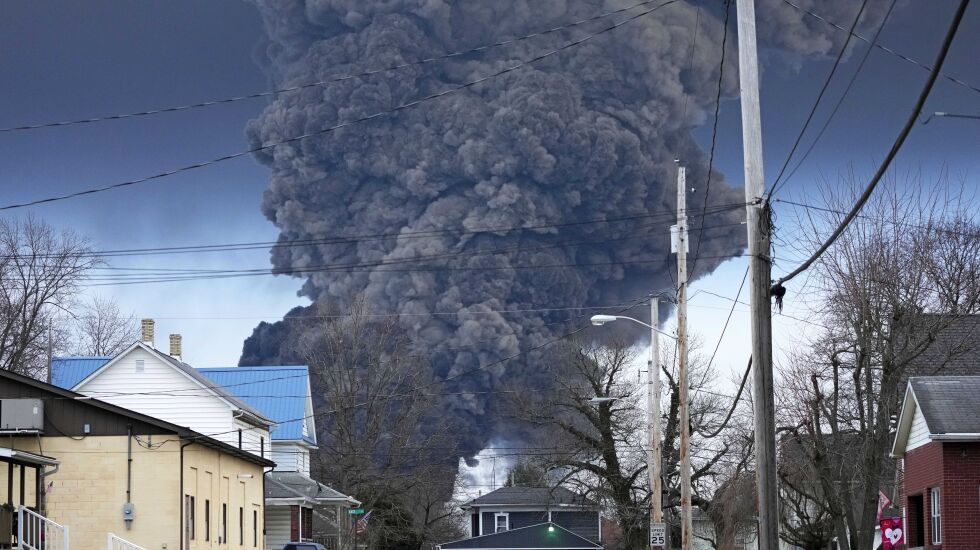
People around East Palestine, Ohio, have been warned not to run their vacuum cleaners.
That was the reality two weeks after a train derailment in the village of about 4,700 people near the border with Pennsylvania, which damaged public health and the environment in ways that still aren’t fully known.
Pennsylvania’s health department has told residents that data from its air quality monitoring “do not indicate a potential for long-term health effects,” but if people choose to vacuum after their evacuation they should do so in “small amounts at a time and take frequent breaks by walking outdoors.”
As confusing as those messages may be, Ohioans have gotten even less information from that state’s government.
Five of the derailed cars contained nearly 1 million pounds of vinyl chloride, a toxic flammable liquid; other cars carried butyl acrylate, ethylhexyl acrylate, and isobutylene. The spills from the wreck have left a long chemical plume moving down the Ohio River at about a mile an hour. The result has been at least 3,500 fish killed. The train’s owner, Norfolk Southern, said it is removing contaminated soil at the crash site, which can leach toxic chemicals into the water and air, after the Environmental Protection Agency (EPA) raised questions.
The immediate need is to respond to make sure that harm to people, wildlife, and waters now and in the future are limited, to the extent we are able. As a starting point, residents need clear, understandable answers about risks they face and support to which they are entitled. While federal authorities generally defer to state officials in disasters, the simmering mistrust caused by the strange odors residents say they smell, the soreness of their throats and the aching in their heads seems to cry out for a different response.
The EPA and Transportation Department must ensure that Norfolk Southern meets its obligation to make things right. The Sierra Club’s Ohio Director Ericka Copeland captured it — “East Palestine and the surrounding communities in Ohio and Pennsylvania deserve full transparency from the EPA, Norfolk Southern, and state leadership… Residents deserve to be able to safely return to their homes and access drinking water without the risk of everyday activities like vacuuming exposing them further to these chemicals.”
Moving forward, we need to do more to protect people and places from hazardous materials that move in more than 2 million freight cars each year. To be fair, reports show that freight rail spills happen less often than spills from trucks or planes. But we know those trains don’t run through posh suburbs. They run through places like East Palestine, a working-class white village where median household income is about two-thirds the Ohio average. They are places that historically get overlooked.
The best news is we already know what to do. While the cause of the Ohio derailment hasn’t been determined officially, reports indicate a wheel bearing in the car that caused the accident overheated; there are sensors for that we can require. Similarly, we can replace braking technology that dates back more than a century with newer brakes that even Norfolk Southern said cuts stopping distances by 60%.
Anyone who saw videos of the burning cars after the crash or the huge cloud of smoke when vinyl chloride was burned off to prevent an explosion may be shocked to learn that the wrecked train wasn’t designated a “high-hazard flammable train,” which would trigger additional safety steps and more notice to state and local officials. This is an easy step to take.
These remedies have been proposed before. The railroad industry calls them too costly. But that claim must be weighed against nearly $200 billion in stock buybacks and dividends for the nation’s biggest rail companies since 2010 as they also cut their workforces.
We can start by restoring brake system and other safety rules rescinded during the Trump administration. Once we push for all these common-sense measures to protect ourselves and our neighborhoods, we should start asking another question — what was going to happen to all those toxic chemicals once they reached the rail yard where they were headed?
Ben Jealous is incoming executive director of the Sierra Club and professor of practice at the University of Pennsylvania. His new book “Never Forget Our People Were Always Free” was just published.
The Sun-Times welcomes letters to the editor and op-eds. See our guidelines.







